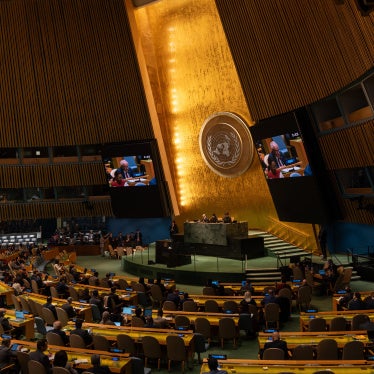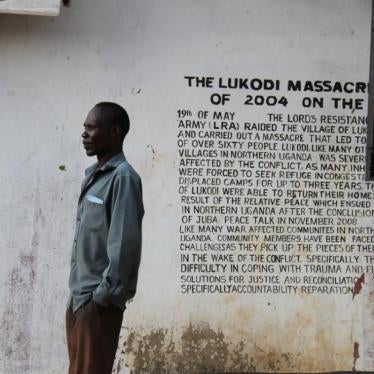Imagine a jury that includes murderers and rapists, or a police force run in large part by suspected murderers and rapists who are determined to stymie investigation of their crimes. Sadly, such spectacles are not far from reality at the United Nations Commission on Human Rights, which is holding its annual meeting in Geneva.
It features the sordid ritual of the world's despots and tyrants scrambling to join a commission that is tasked with investigating and condemning the world's despots and tyrants.
Although not a judicial body, the commission is the UN membership's chief human rights organ. It is composed of 53 governments, chosen for three-year terms. According to the usual UN procedure, each regional bloc of governments selects an assigned number of commission members. There are no minimum criteria for membership. Dictatorships are as free as democracies to serve.
The latest batch of new members illustrates how poorly this system works. They include such dubious paragons of human rights virtue as Algeria, the Democratic Republic of the Congo, Kenya, Libya, Saudi Arabia, Syria and Vietnam.
Needless to say, such governments do not seek membership out of a commitment to promote human rights abroad or to improve their own abysmal human rights records. Rather they join the commission to protect themselves from criticism and to undermine its work.
This sabotage takes two forms. First, abusive governments can usually be counted on to reject efforts to criticize other abusive governments. For example, each year when China lobbies against condemnation of its repressive rule it can count on a sympathetic ear from the many other abusive countries on the commission.
With the cards thus stacked, action against even the worst human rights abusers is difficult to secure.
That, in part, is why, even in the aftermath of the 1989 Tiananmen Square crackdown, the commission never mustered enough votes to condemn China, and why the Iraqi dicta-tor Saddam Hussein could gas and execute tens of thousands of Kurds with impunity before his ill-fated invasion of Kuwait.
Second, abusive governments have become quite creative in proposing "reforms" that would impair the commission's ability to generate pressure on behalf of human rights.
A typical proposal put forward by Cuba, a longtime commission member, targeted the special rapporteurs and working groups that the commission deploys to investigate and report on serious human rights abuses. Backed by a bevy of repressive allies, Cuba proposed precluding these investigators from reporting their findings publicly until they have been delivered to the annual session of the commis-sion - a requirement that, if adopted, would have meant lengthy delays and vastly decreased effectiveness.
The abusive governments that flock to the commission frequently refuse to cooperate with UN investigators. Cuba refused for years to allow a visit by the rapporteur assigned to monitor its human rights record. China and Algeria are stonewalling on requests for visits by the rapporteur on torture. Russia has blocked visits to Chechnya by the rapporteurs on torture and extrajudicial execution.
The most egregious case was Sudan. When a rapporteur denounced its violations of religious freedom, it called him an "enemy of Islam." Yet Sudan was later rewarded for this rejectionism with the deputy chairmanship of the commission.
The good news behind this rallying of the repressive is that the United Nations' human rights machinery matters. Governments go to great lengths to avoid UN exposure or condemnation of their atrocities.
The bad news is that a mafia-like code of silence reins in Geneva, with one abuser covering for another, knowing that, when necessary, the favor will be reciprocated. It would be a mistake to attribute responsibility for this sorry state of affairs to the United Nations itself. Secretary-General Kofi Annan and the human rights commissioner, Mary Robinson, have spoken out with unprecedented candor on behalf of human rights.
Rather, blame lies with the member states, the governments that allow this farce to continue year after year. The United States and its closest Western allies are hardly happy about this state of affairs. They do their best to work around it. But they have yet to tackle the problem head-on.
It is time for a rule requiring any prospective commission member to demonstrate a minimum of respect for human rights. In addition, all candidate governments should be required to extend a standing invitation to the commission's various investigators, allowing them to visit their countries whenever they want. Such reforms would require some degree of compliance with the rights that the commission upholds and would end the travesty of governments using their commission membership to block the very work that they claim to support.






